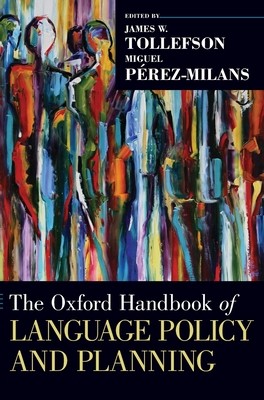
- We will send in 10–14 business days.
- Publisher: Oxford University Press, USA
- ISBN-10: 0190458895
- ISBN-13: 9780190458898
- Format: 17.8 x 24.9 x 4.8 cm, hardcover
- Language: English
- SAVE -10% with code: EXTRA
The Oxford Handbook of Language Policy and Planning (e-book) (used book) | bookbook.eu
Reviews
Description
This Handbook provides a state-of-the-art account of research in language policy and planning (LPP). Through a critical examination of LPP, the Handbook offers new direction for a field in theoretical and methodological turmoil as a result of the socio-economic, institutional, and discursive processes of change taking place under the conditions of Late Modernity. Late Modernity refers to the widespread processes of late capitalism leading to the selective privatization of services (including education), the information revolution associated with rapidly changing statuses and functions of languages, the weakening of the institutions of nation-states (along with the strengthening of non-state actors), and the fragmentation of overlapping and competing identities associated with new complexities of language-identity relations and new forms of multilingual language use. As an academic discipline in the social sciences, LPP is fraught with tensions between these processes of change
and the still-powerful ideological framework of modern nationalism. It is an exciting and energizing time for LPP research.
EXTRA 10 % discount with code: EXTRA
The promotion ends in 19d.09:51:31
The discount code is valid when purchasing from 10 €. Discounts do not stack.
- Publisher: Oxford University Press, USA
- ISBN-10: 0190458895
- ISBN-13: 9780190458898
- Format: 17.8 x 24.9 x 4.8 cm, hardcover
- Language: English English
This Handbook provides a state-of-the-art account of research in language policy and planning (LPP). Through a critical examination of LPP, the Handbook offers new direction for a field in theoretical and methodological turmoil as a result of the socio-economic, institutional, and discursive processes of change taking place under the conditions of Late Modernity. Late Modernity refers to the widespread processes of late capitalism leading to the selective privatization of services (including education), the information revolution associated with rapidly changing statuses and functions of languages, the weakening of the institutions of nation-states (along with the strengthening of non-state actors), and the fragmentation of overlapping and competing identities associated with new complexities of language-identity relations and new forms of multilingual language use. As an academic discipline in the social sciences, LPP is fraught with tensions between these processes of change
and the still-powerful ideological framework of modern nationalism. It is an exciting and energizing time for LPP research.


Reviews